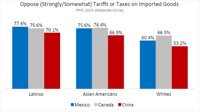
(Photo by Mario Tama/Getty Images)
As 2023 comes to a close, we decided to highlight some of the best opinion pieces and guest essays that we have featured at CALÓ News this year. These pieces are by Los Angeles area writers and or about issues of importance to our diverse Latino community.
Resisting Gentrification by Rachel Mendiola
From “spa water” to “Mexican street corn salad,” it’s no secret that gentrification subjugates objects, spaces and memory. Gentrification is the displacement of urban neighborhoods experiencing economic decline. It happens for a variety of unjust reasons. Reasons may include a wealthier population moving in, improved (yet unaffordable) housing or the attraction of new businesses. Gentrification is colonization. Money waves its unmagical wand. Beloved locations turn into the unrecognizable. It happened to my family’s favorite shopping plaza and childhood staple of mine: La Cuatro.
Is there a void in Latino leadership? by francisco aviles pino
Elected offices are about reaching a finish line in a race full of hurdles, secret traps and compromises. For Latino community leaders to become candidates and later elected officials, it also requires a base of trust and investment. When we reflect on what has happened in the last year with the Los Angeles City Council leaked tapes controversy, the marker of Latino representation in Los Angeles was flipped upside down. It continues to raise questions for those inside and outside the ballpark of Los Angeles politics, in this state and beyond.
Sadly, when our leaders are disgraced, whether it’s the former LA City Council president Nury Martinez or U.S. Robert Menendez, fair or not, it hurts all Latino/a leaders.
Digital redlining hurts communities of color by Elizabeth Alcantar
Digital redlining also has profound implications for civic engagement. The internet has become an essential tool for accessing government services, participating in political discourse, and advocating for change. By depriving communities of color of reliable internet access, companies like AT&T undermine their ability to engage in the democratic process. This further marginalizes these communities, hindering their voices from being heard and their concerns from being addressed.
Latinos, let’s talk about our mental health by Hilda H. McClure
In Latinx culture, we believe in putting the family system first, often living intergenerationally. We celebrate “personalismo” and “confianza” often inviting many others into the fold of our comunidad. And although resilience is nuanced, we value our capacity to endure and overcome challenges. We celebrate that as a people we are hearty, strong and capable. Let’s not forget all the yummy food that we have created, and the parties we throw to gather and eat together. To be sure, we always have things we can work on within our culture like removing some of the stigma around mental health, but our own culture promotes well-being when we lean into it.
The political violence of relocating immigrants by Deisy Del Real
Since early 2022, Florida Gov. Ron DeSantis and Taxes Gov. Greg Abbott have been weaponizing immigrants’ suffering to gain political clout. They have used their constituents’ tax dollars to relocate migrants into Democratic-led states. They are using this tactic to gain influence within the Republican party and win future elections.
Let’s be clear, these political stunts are a form of political violence. Vulnerable immigrants must withstand the violence of being deceived, not being given the dignity of informed consent, and public humiliation.
U.S. Senators introduce DACA bill by Patricia Guadalupe
Here we go again. That’s the reaction of immigrant advocates about a couple of pieces of legislation recently introduced in the U.S. Senate that would create a pathway to citizenship for the hundreds of thousands of beneficiaries nationwide of the Deferred Action for Childhood Arrivals (DACA) and Temporary Protected Status (TPS). One bill focused entirely on DACA recipients – those who were brought to the United States as minors and are known informally as DREAMers – is actually bipartisan, introduced by senators Dick Durbin of Illinois and Lindsey Graham of South Carolina.
The Importance of Raza Representation on the Big Screen by Álvaro Huerta
In the case of Hollywood movies, for too long—past and present—Latinas/os (in general) and Chicanas/os or Mexican Americans (in particular) have been mostly invisible and marginalized. When visible, they/we are portrayed as drug dealers, criminals and rapists, as uttered by the hustler Donald Trump. We are also erased.
I Don’t Care That You’re Not Bilingual by Anasazi Ochoa
This is a formal apology to “no sabo” kids everywhere.
I have a vivid memory of a friend from kindergarten, Teresa, who was Latina like me. The physical juxtaposition of my brown skin and dark, curly hair, my friend Teresa had red hair and freckles on every inch of her face, but she spoke fluent Spanish. Although I had grown up speaking colloquial Spanish around the house, my grammar had not yet been perfected.
Raíces, memories of El Salvador by Catherine Lima
My mother migrated to the United States from El Salvador in 1992 in search of a better life after having lived through the civil war. Naturally, as the first-born of three, I am the most connected to my Salvadoran heritage. I’ve traveled three times to the motherland to visit my family, and I know I’m at home when I get a whiff of fresh brewed coffee, a staple in just about every Salvadoran household. With the Los Angeles weather beginning to cool down and the holidays approaching, I am looking forward to dipping my mom’s fresh-baked quesadillas into my warm cup of coffee. They are not to be confused with Mexican quesadillas, which are primarily made with tortilla and queso. Salvadoran quesadillas are essentially cheesecakes with a combination of different flavors such as cinnamon, vanilla, sugar, cream, and (you guessed it) cheese. Sometimes they are topped off with sesame seeds to add a little extra texture.
Raíces, Finding family in Mexico by Teresa Puente
My maternal great grandfather crossed the border into Texas around 1890. At that time, you didn’t need a green card or passport. He travelled on horseback and a wagon with his family and settled in Carrizo Springs, Texas.He later became a deputy sheriff in the town and was the first lawman killed in the line of duty in Dimmit County Texas in 1913. I wrote about his story before and published it in a Texas newspaper. But I never wrote about the time I travelled 20 years ago to his hometown of San Buenaventura, Coahuila. I was the first person in my extended family to go back to the town. I had to take a bus a few hours from the border near Nuevo Laredo and then hire a cab to the town of less than 20,000 people. All I had with me as clues were his name, Candelario Ortiz, and a list of his siblings who presumably stayed behind. I hoped that maybe I could connect with a distant relative.
Our Latina Beyoncé is Karol G by Clariza Ruiz De Castilla
Growing up, I remember hearing that Selena Quintanilla was our queen, nuestra reina; she was like our Beyoncé. This connection is obvious: they are both from Texas, multi-talented, producing award winning music, have different “hats” (Selena not just sang, but was also starting her fashion line; Beyoncé sings as well as acts), and have achieved global success.
While Selena is everlasting and won’t ever be forgotten, there is a new reina we can look up to. Karol G, born Carolina Giraldo Navarro, is a 32-year old musician taking over not only this country, but the world.











(0) comments
Welcome to the discussion.
Log In
Keep it Clean. Please avoid obscene, vulgar, lewd, racist or sexually-oriented language.
PLEASE TURN OFF YOUR CAPS LOCK.
Don't Threaten. Threats of harming another person will not be tolerated.
Be Truthful. Don't knowingly lie about anyone or anything.
Be Nice. No racism, sexism or any sort of -ism that is degrading to another person.
Be Proactive. Use the 'Report' link on each comment to let us know of abusive posts.
Share with Us. We'd love to hear eyewitness accounts, the history behind an article.